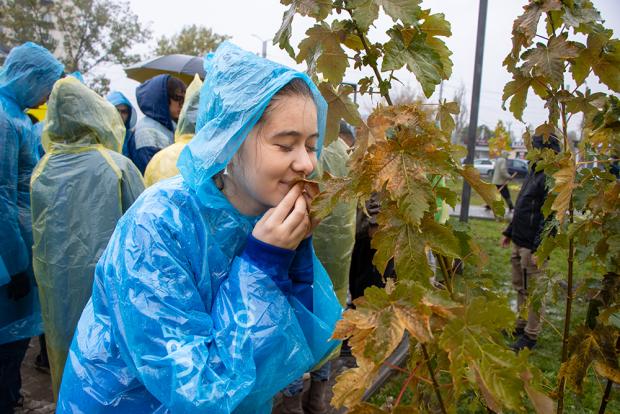Youth in Central Asia make their voices heard ahead of COP 27 at conference organized by OSCE and German Agency for International Cooperation
The Regional Conference of Youth on Climate Change in Central Asia was held in Bishkek from 24 to 27 October 2022, bringing together over 50 participants, remotely and in-person, from Kazakhstan, Kyrgyzstan, Tajikistan, Turkmenistan and Uzbekistan to lay the groundwork for a Central Asia Youth Network on Climate Change and create a unified youth statement on climate change ahead of the upcoming COP27.
Organized by the Office of the Co-ordinator of OSCE Economic and Environmental Activities (OCEEA), the OSCE Programme Office in Bishkek, and the German Agency for International Cooperation (Deutsche Gesellschaft für Internationale Zusammenarbeit, GIZ), the conference aimed to raise awareness on challenges caused by climate change in Central Asia, including its security implications, and to discuss the role and engagement of youth.
Prior to the Conference, the participants benefitted from an online training on climate change that was conducted from 29 September to 10 October. In addition to discussions in plenary and working groups, the Conference included simulation games, scenario-setting activities, and field visits.
“Today’s conference is the first concrete step towards setting up a Youth Network on Climate Change in Central Asia. I am confident that the platform we are initiating today will raise the potential of youth, empower them, and help integrating youth perspectives in tackling climate change and its security implications in Central Asia,” said Igli Hasani, Co-ordinator of OSCE Economic and Environmental Activities.
In his opening remarks, Hasani drew attention to the 2021 OSCE Ministerial Council Decision on climate change, which calls on the OSCE participating States to intensify their dialogue and co-operation towards climate resilience, adaptation, and mitigation, and underlined that the Decision also recognizes the important role of youth.
“The future depends on each one of us. Greening our economies, growth and lifestyle is not a choice, but a necessity for mitigating and adapting to climate change and for a resilient, sustainable, and peaceful future. I am confident that with the innovative spirit of the young generation, what we call 'green' today will just be the new 'normal' tomorrow,” said Alexey Rogov, Head of the OSCE Programme Office in Bishkek.
Central Asia is acutely affected by climate change. At the same time, there are many opportunities for co-operation among the countries of the region to tackle the multiple challenges caused by climate change together. The youth network, once established, will enable an exchange platform for youth and youth organizations from Central Asia on climate change.
“Mutual exchange and co-operation are very important for finding solutions to pressing problems,” sai Gabriela Guellil, Ambassador of the Federal Republic of Germany to the Kyrgyz Republic. “One such issue is climate change. I am certain that this conference on regional youth cooperation in Bishkek will offer new ideas and new answers. Together we can bring about change.”
At the conclusion of the conference, participants agreed on a youth statement that reveals the readiness and enthusiasm of young people to act together and puts forward a set of proposals for action in areas such as climate adaptation, mitigation, resilience, finance and justice.
“We, young people of Central Asia, are proud to come up with a Youth Statement on Climate Change from our region. We will convey our messages and proposals to the 17th Conference of Youth and the COP 27 both convening in Sharm el-Sheikh,” said Sviatoslav Lykhin, representative of the NGO Students of Kyrgyzstan for a Green Economy.
The Regional Conference of Youth on Climate Change in Central Asia was organized within the framework of the OSCE extra-budgetary project “Strengthening responses to security risks from climate change in South-Eastern Europe, Eastern Europe, the South Caucasus, and Central Asia,” which is implemented in partnership with Berlin-based think tank adelphi and funded by Andorra, Austria, Czech Republic, Finland, France, Germany, Italy, Liechtenstein, Luxembourg, Norway, Poland, Sweden, and the United States.




